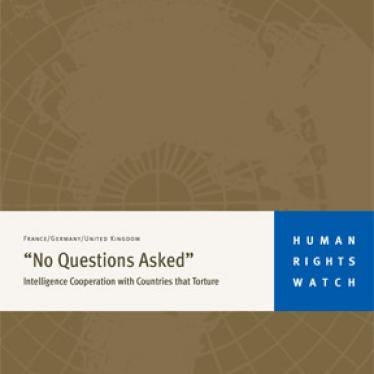Confronted with fresh evidence unearthed by Human Rights Watch that the UK security services were complicit in the rendition and possible torture of opponents of the Gaddafi regime, Prime Minister David Cameron gave a confident performance in the House of Commons. He told MPs that the “significant accusations” would be looked at “very carefully” by the existing Detainee Inquiry.
Judging from the coverage across most of the British media, all’s well that ends well. The Detainee Inquiry will examine the claims, the truth will out and the right lessons will be learned.
In fact the Detainee Inquiry has been so hamstrung by the government that a full reckoning is practically impossible. As a result, leading nongovernmental organizations that campaigned for its creation, including Human Rights Watch, and lawyers acting for the detainees, have withdrawn their cooperation.
The inquiry suffers from two key defects. First, members of the security services (with the exception of the MI5 and MI6 chiefs) will give evidence behind closed doors. That means there will be no meaningful opportunity for those who were subject to torture, rendition or illegal detention and the groups that documented those abuses to challenge the official version of events. The inquiry will be denied the full picture and will be less likely to identify all relevant evidence.
Creating a mechanism that allows interested parties to test secret evidence is vital to the success of the inquiry.
Second, the Inquiry isn’t authorized to decide what documents or evidence to publish. That power rests solely with the government. While the inquiry can argue for publication, the government has wide grounds for refusal, including preserving diplomatic relations. The Cabinet Secretary has the final say.
If the tenacious efforts by the previous government to block publication of a paragraph implicating the UK in the abuse of the former Guantanamo Bay detainee Binyam Mohammed are any guide, the government will never approve for publication embarrassing documents like the ones my organization discovered last weekend.
The government insists that the inquiry will have access to all the documents and that their access is what matters. But it is far from clear how the inquiry will be able to determine whether there has been full disclosure. The individuals, journalists and groups best placed to help identify missing documents will have no idea what the gaps are.
Public knowledge of what transpired is also crucial to prevent these abuses from happening again. Human rights groups like ours reported for years about the involvement of the UK and other European governments in US rendition and other abuses in the name of counterterrorism. Our efforts, and investigations by the Council of Europe and European Parliament, were met with persistent and barefaced denial by the European governments involved.
Only when classified documents were published demonstrating that knowledge and involvement did the wall of denial begin to break down.
Some documents should not be made public for genuine national security reasons. But the presumption should be in favour of publication, and the final decision should rest with an independent judge -- not the government.
The Coalition Government was not in power when the alleged abuses took place, but its initial decision to announce an independent inquiry was courageous. It has since lost its nerve.
The Prime Minister told the Commons in July last year that the Inquiry was necessary to “restore Britain’s moral leadership in the world,” adding that, “The longer these questions remain unanswered, the bigger the stain on our reputation as a country that believes in freedom, fairness and human rights grows.”
The documents from Libya should be a wake-up call for the government. If it is serious about restoring moral leadership and preventing the recurrence of abuses that continue to stain Britain’s reputation, it should start by reforming the Detainee Inquiry.
Benjamin Ward is deputy Europe division director at Human Rights Watch








